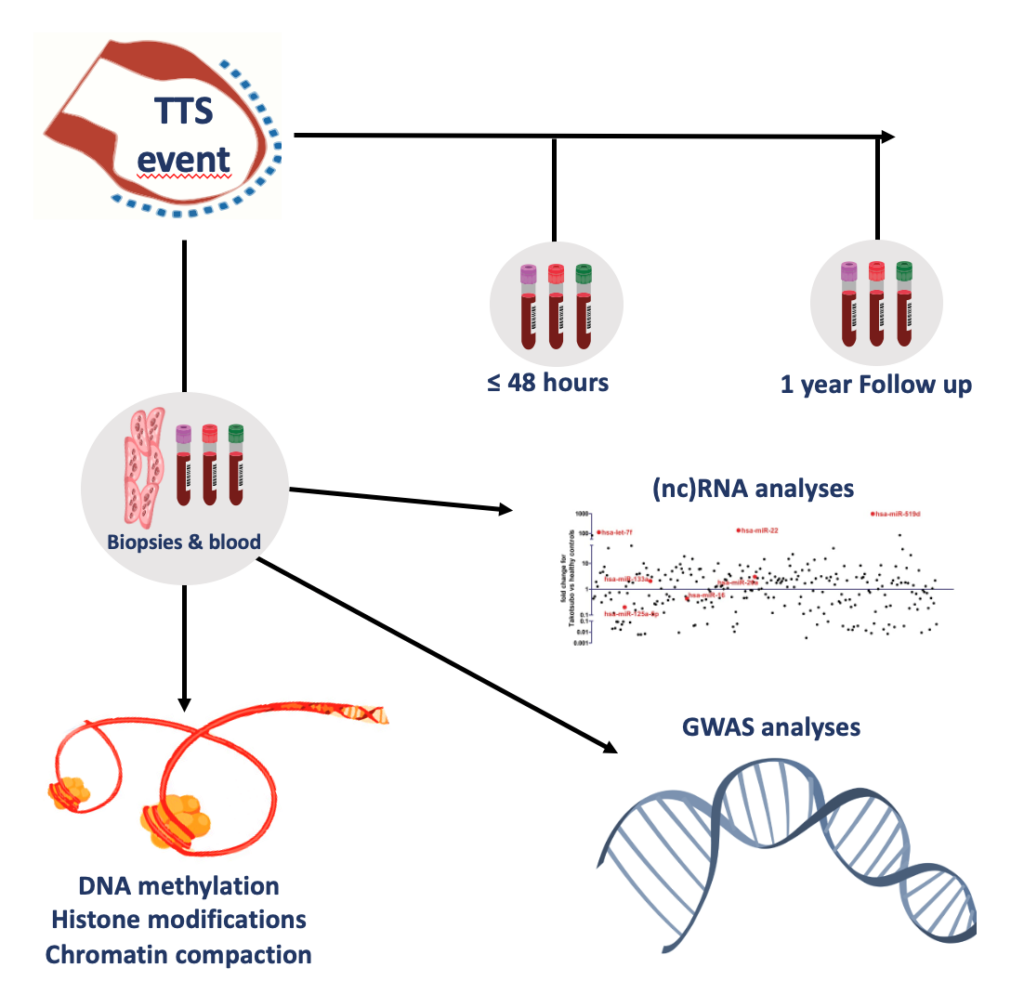Takotsubo Syndrome – closing the gaps (Group leader: Prof. Dr. med. Dr. rer. nat. Christian Templin)
The research of the InterTAK Study Group, led by Professor Templin, has made an important contribution to the current knowledge and understanding of Takotsubo syndrome.
While clinical studies based on the InterTAK registry were able to provide a better clinical characterization of TTS and provide prognostic information about short- and longterm outcomes, as well as hints on basic pathophysiological causes, many important questions regarding the syndrome still remain unanswered. For us some of these main questions concern the role of biomarkers in the diagnosis of TTS, the role of genetics in the susceptibility to the disease, and most importantly, whether there are specific therapeutic options. While holding the largest biobank on Takotsubo syndrome to date, the aim of our research is the identification of novel biomarkers on the level of small molecules, (nc)RNAs and proteins, as well as the identification of genetic and epigenetic factors that influence the susceptibility of patients to develop Takotsubo Syndrome. Moreover, we aim to test promising therapeutic options in in-vitro and in-vivo experimental studies as well as to make further progress in understanding the molecular mechanisms of this very unique disease.

Figure 1. Timecourse of the InterTAK blood collection and planned analyses.
Ongoing research
- GWAS analysis to identify susceptibility genes for Takotsubo syndrome.
- Profiling of ncRNAs in the acute event of Takotsubo patients to identify biomarkers and their role in the pathophysiology of Takotsubo syndrome
- Epigenetic profiling in TTS patients
- Cardioimmunological profiling, assessment of immune cell distribution in cardiac tissue and their transcriptional profiling
Research Team
- Christian Templin, MD PhD
- Jelena-Rima Templin-Ghadri, MD
- Victoria Cammann, MD PhD
- Victor Schweiger, MD
- Michael Würdinger, MD
- Jan Kleeberger, MD
- Davide DiVece, MD
Funding
- Swiss Heart Foundation research grant
- Iten-Kohaut Stiftung research grant
- Templin C, Ghadri JR, Diekmann J, Napp LC, Bataiosu DR, Jaguszewski M, et al. Clinical Features and Outcomes of Takotsubo (Stress) Cardiomyopathy. New England Journal of Medicine. 2015 Sep 3; 373(10):929–38.
- Ghadri JR, Kato K, Cammann VL, Gili S, Jurisic S, di Vece D, et al. Long-Term Prognosis of Patients With Takotsubo Syndrome. J Am Coll Cardiol. 2018 Aug 21; 72(8):874–82.
- Ghadri JR, Wittstein IS, Prasad A, Sharkey S, Dote K, Akashi YJ, et al. International Expert Consensus Document on Takotsubo Syndrome (Part I): Clinical Characteristics, Diagnostic Criteria, and Pathophysiology. Eur Heart J. 2018 Jun 7; 39(22):2032–46.
- Templin C, Hänggi J, Klein C, Topka MS, Hiestand T, Levinson RA, et al. Altered limbic and autonomic processing supports brain-heart axis in Takotsubo syndrome. Eur Heart J. 2019 Apr 4; 40(15):1183.
- Jaguszewski M, Osipova J, Ghadri JR, Napp LC, Widera C, Franke J, et al. A signature of circulating microRNAs differentiates takotsubo cardiomyopathy from acute myocardial infarction. Eur Heart J. 2014; 35(15):999–1006.